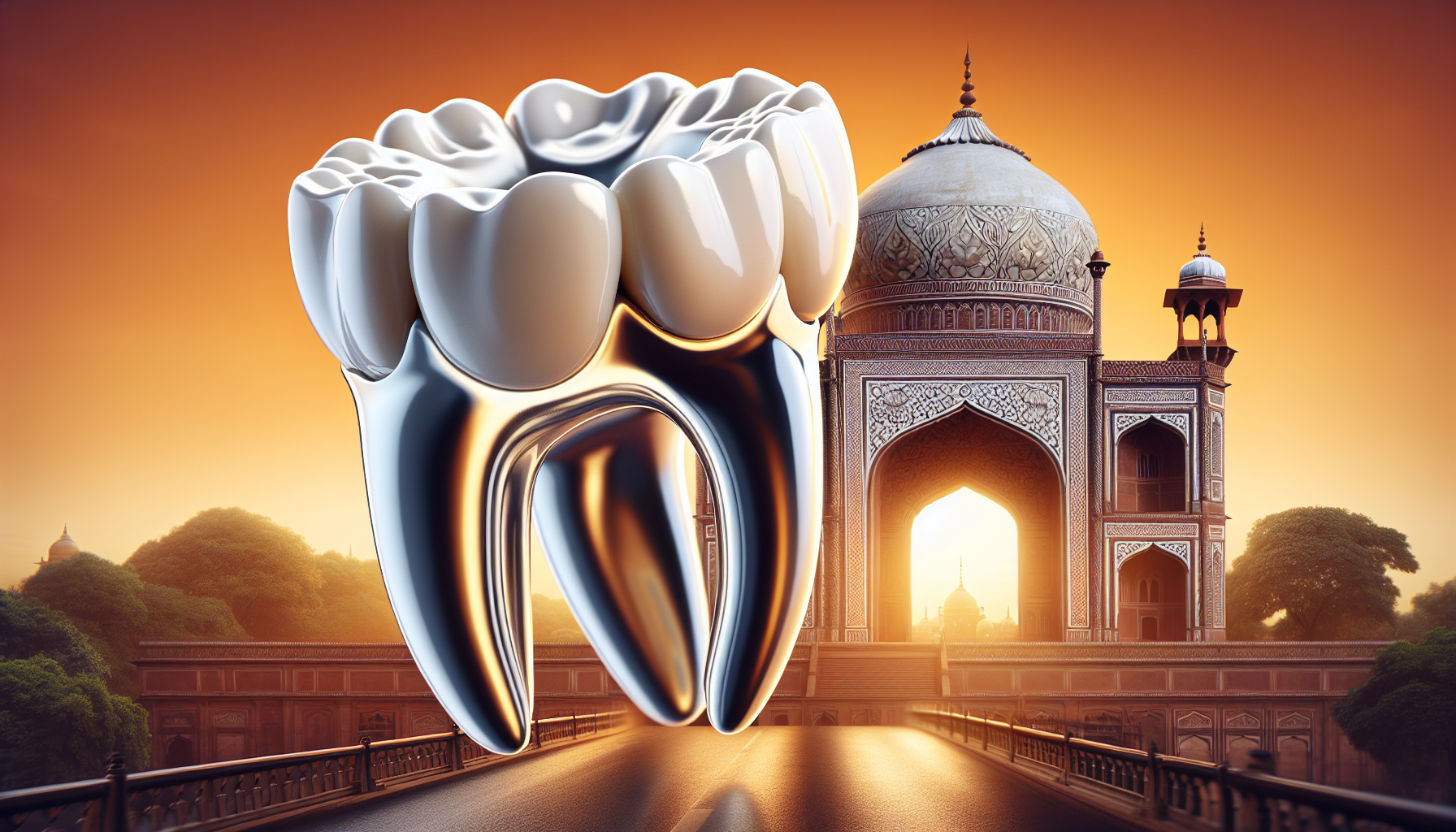Looking for a cost-effective and high-quality solution for dental bridges? Look no further than India! With its booming medical tourism industry, you can now experience world-class healthcare and restore your dental function in the heart of this culturally rich country. Discover the benefits of dental tourism for dental bridges in India, where you not only receive top-notch treatments but also get an opportunity to immerse yourself in India’s vibrant culture.

Overview of Dental Tourism in India
India has emerged as a popular destination for dental tourism in recent years. People from all over the world are choosing to travel to India to receive high-quality dental treatment at affordable prices. The country boasts advanced dental infrastructure and a multitude of highly skilled dentists who provide top-notch dental care. In this article, we will explore the growing popularity of dental tourism in India, the advantages it offers, and the advanced dental infrastructure that makes it a preferred choice for dental procedures.
Growing popularity of dental tourism
Dental tourism in India has gained immense popularity due to the significant cost savings and the opportunity to combine dental treatment with a vacation in a culturally rich country. Many people find that they can save up to 70-80% on dental treatment costs compared to their home countries. This affordability, coupled with the high quality of dental care, has made India an attractive destination for dental tourists.
Advantages of dental tourism in India
There are several advantages of choosing dental tourism in India. Apart from the cost savings, patients can benefit from the expertise of Indian dentists who are well-trained and experienced in performing various dental procedures. The dental facilities in India are equipped with state-of-the-art technology and adhere to international standards. Additionally, the ease of travel and accessibility make it convenient for patients to plan their dental treatments in India.
India’s advanced dental infrastructure
India has made significant strides in developing advanced dental infrastructure. Major cities in India have cutting-edge dental clinics and hospitals that offer a wide range of dental treatments, including dental bridges. These facilities are equipped with the latest dental technologies such as digital x-rays, CAD/CAM systems, and laser dentistry. With a focus on quality and patient satisfaction, Indian dental infrastructure is on par with global standards.
Introduction to Dental Bridges
Dental bridges are a common dental restoration option used to replace missing teeth. They are designed to bridge the gap created by one or more missing teeth, helping to restore both function and aesthetics. A dental bridge consists of an artificial tooth or teeth (pontics) that are anchored or supported by adjacent teeth or dental implants.
Definition and purpose of dental bridges
A dental bridge is a prosthetic device that helps restore a patient’s ability to chew and speak properly. In addition to restoring functionality, dental bridges also improve the appearance of the smile by filling in the gaps left by missing teeth. They prevent the surrounding teeth from shifting and provide support to the facial structures, preventing a sunken or aged appearance.
Types of dental bridges
There are different types of dental bridges available depending on the specific needs of the patient. The traditional bridge is the most common type, where the pontic is supported by dental crowns placed on the adjacent natural teeth. Another type is the cantilever bridge, which is used when there is only one adjacent tooth available for support. Maryland bridges and implant-supported bridges are also options for patients with specific requirements.
Benefits of dental bridges
Dental bridges offer numerous benefits to those who have missing teeth. They restore natural biting and chewing ability, improving overall oral function. By filling in the gaps, bridges enhance the appearance of the smile, boosting self-confidence. In addition, dental bridges can help maintain the shape of the face and prevent further tooth loss by distributing forces evenly in the bite. They are a long-lasting and cost-effective solution for replacing missing teeth.

Why Choose Dental Tourism for Dental Bridges in India?
Many people choose dental tourism in India specifically for dental bridges due to the numerous advantages it offers. Let’s explore the reasons why India is a preferred destination for dental bridge treatment.
Cost-effective treatment options
One of the main reasons why people opt for dental tourism in India for dental bridges is the cost savings. Patients can expect to save a significant amount of money compared to the prices in their home countries. The lower cost of living in India, along with the competitive pricing of dental treatments, allows patients to receive high-quality dental bridges at a fraction of the cost.
Quality and expertise of Indian dentists
Indian dentists have earned a reputation for their expertise and skill in providing dental treatments. They undergo rigorous training and education, keeping up with the latest advancements in dentistry. Many dentists in India have also completed international certifications and have experience working with patients from various countries. By choosing dental tourism in India, patients can benefit from the high level of dental expertise available in the country.
Ease of travel and accessibility
India is well-connected to major parts of the world, making it easily accessible for dental tourists. The country has a well-developed transportation network, including international airports and a reliable public transportation system. English is widely spoken in India, which makes communication easier for international patients. Additionally, India offers a rich cultural experience, enticing tourists with its historical sites, diverse cuisine, and warm hospitality.
Choosing the Right Dental Clinic in India
Selecting the right dental clinic is crucial to ensure a successful dental bridge treatment. Here are some steps to consider when choosing a dental clinic in India.
Researching the best dental clinics
Start by researching the best dental clinics in the desired location in India. Look for clinics that specialize in dental bridges and have a strong reputation for delivering quality dental care. Check if the clinic has modern facilities and advanced technology. Consider their years of experience and the qualifications of their dental professionals.
Reading patient reviews and testimonials
Patient reviews and testimonials provide valuable insights into the quality of care provided by a clinic. Read reviews on reputable platforms or websites to get an idea of the experiences of previous patients. Look for positive feedback regarding the communication, professionalism, and outcomes of the dental bridge treatments.
Consulting with dental professionals
Before making a final decision, it is advisable to consult with dental professionals in the selected clinic. Schedule a virtual or in-person consultation to discuss your specific case and ask any questions you may have. This will help you assess the expertise and approach of the dental professionals and determine if they are the right fit for your dental bridge treatment.

Preparing for Dental Tourism in India
Proper preparation is key to a successful dental tourism experience in India. Here are some steps to follow when preparing for dental bridge treatment in India.
Understanding the dental bridge procedure
Educate yourself about the dental bridge procedure to have a clear understanding of what to expect. Talk to your dentist or the chosen dental clinic in India to obtain detailed information about the treatment process, including the duration of the procedure, the number of appointments required, and pre and post-treatment care instructions.
Gathering necessary medical documentation
Before traveling to India, gather all necessary medical documentation related to your dental health. This may include recent dental x-rays, dental and medical history, and any prescriptions or recommendations from your current dentist. Having these documents ready will help the dental professionals in India plan your treatment efficiently.
Arranging travel and accommodation
Make necessary arrangements for your travel and accommodation in India. Look for accommodation options that provide easy access to the chosen dental clinic. Consider the duration of your stay and plan accordingly. It is advisable to arrive a day or two before your scheduled dental bridge treatment to allow for any potential adjustments or consultations.
Safety and Quality Standards in Indian Dental Clinics
Indian dental clinics maintain high safety and quality standards to ensure patient well-being and satisfaction. Here are some factors to consider when evaluating the safety and quality standards of a dental clinic in India.
Accreditation and certifications
Check if the dental clinic has appropriate accreditations and certifications from recognized dental organizations. These certifications indicate that the clinic adheres to specific standards in terms of infrastructure, equipment, and patient care. Look for certifications such as ISO certification and membership in dental associations.
Hygiene and sterilization practices
Dental clinics in India prioritize hygiene and follow strict sterilization protocols. Inquire about the clinic’s infection control practices, including the use of disposable instruments, sterilization techniques, and adherence to international guidelines. A clean and sterile environment is crucial to ensure patient safety during dental procedures.
Ensuring patient safety
A reputable dental clinic will prioritize patient safety and take necessary precautions. These may include a proper assessment of the patient’s medical history, clear communication about the potential risks and complications of the dental bridge procedure, and the availability of emergency measures during the treatment. Ask the dental clinic about their safety protocols to ensure peace of mind.
The Dental Bridge Procedure in India
When undergoing a dental bridge procedure in India, several steps are involved. Let’s take a closer look at the process.
Initial consultation and examination
The dental bridge procedure begins with an initial consultation and examination at the chosen dental clinic. The dentist will assess your dental health, take x-rays if necessary, and discuss the treatment plan with you. This is an opportunity for you to ask any questions or express any concerns you may have.
Tooth preparation and impressions
In the next step, the dentist will prepare the adjacent teeth that will support the dental bridge. A small portion of enamel will be removed to create space for the bridge. Impressions of the prepared teeth and the gap will be taken to create a custom-made dental bridge in a dental laboratory. The dentist will place a temporary bridge to protect the prepared teeth while the final bridge is being fabricated.
Fitting and placement of the dental bridge
Once the final dental bridge is ready, you will return to the dental clinic for the fitting and placement. The dentist will remove the temporary bridge and try in the final bridge to check the fit and aesthetics. After making any necessary adjustments, the dentist will permanently cement the bridge in place. You will be provided with instructions on how to care for your new dental bridge.
Post-Treatment Care and Follow-up
Proper post-treatment care and follow-up are essential for the success and longevity of your dental bridge. Here are some key considerations for post-treatment care.
Proper oral hygiene practices
Maintaining good oral hygiene is crucial after getting a dental bridge. Brush your teeth at least twice a day with a soft-bristled toothbrush and use dental floss or interdental brushes to clean between the teeth and under the bridge. Be gentle and avoid putting excessive pressure on the bridge.
Dietary restrictions and suggestions
Initially, it is advisable to stick to a soft diet for a few days after getting a dental bridge. Avoid hard, sticky, or chewy foods that could dislodge or damage the bridge. Gradually introduce solid foods, and if necessary, consult your dentist for specific dietary suggestions based on your situation.
Scheduling follow-up appointments
Regular follow-up appointments with your dentist are important to monitor the condition of your dental bridge and overall oral health. The dentist will check the fit, function, and appearance of the bridge and address any issues that may arise. It is recommended to adhere to the recommended follow-up schedule for optimal oral health.
Exploring India’s Vibrant Culture
While in India for dental treatment, take the opportunity to explore the vibrant culture and immerse yourself in the country’s rich heritage. Here are some experiences you can consider during your stay.
Sightseeing and tourist attractions
India is home to numerous UNESCO World Heritage Sites and iconic landmarks. Consider visiting the Taj Mahal in Agra, the Golden Temple in Amritsar, or the beautiful beaches of Goa. Explore historical monuments, bustling markets, and picturesque landscapes to create unforgettable memories during your dental tourism trip.
Cuisine and local experiences
India is renowned for its diverse and flavorful cuisine. Indulge in traditional Indian dishes and savor the aromatic spices that make the food so unique. Take part in cooking classes or food tours to learn about the different regional cuisines. Immerse yourself in the local culture by visiting markets, attending festivals, or participating in traditional ceremonies.
Traditional practices and festivals
India is known for its vibrant festivals and cultural celebrations. Depending on the time of your visit, you may have the opportunity to witness or participate in festivals such as Diwali, Holi, or Navratri. Explore traditional crafts, music, and dance forms that reflect the rich cultural heritage of India.
Frequently Asked Questions about Dental Tourism for Dental Bridges in India
Here are some answers to frequently asked questions about dental tourism for dental bridges in India.
Is dental tourism in India safe?
Yes, dental tourism in India is generally safe. Dental clinics in India adhere to international safety and hygiene standards. However, it is essential to choose a reputable dental clinic with proper accreditations and certifications to ensure the highest level of safety and quality care.
What is the cost of dental bridges in India?
The cost of dental bridges in India can vary depending on several factors, such as the type of bridge, the materials used, and the complexity of the case. Generally, dental bridges in India are significantly more affordable compared to many other countries, with potential cost savings of up to 70-80%.
How long does the dental bridge procedure take?
The duration of the dental bridge procedure depends on various factors, including the number of teeth involved, the condition of the supporting teeth, and the type of bridge chosen. On average, the process may take a few weeks to complete, including the preparation, fabrication, and placement of the dental bridge.
In conclusion, dental tourism in India offers a cost-effective and high-quality solution for patients seeking dental bridges. With India’s advanced dental infrastructure and skilled dentists, patients can receive top-notch dental care while enjoying the rich cultural experiences the country has to offer. By choosing dental tourism in India, patients can restore their dental function and smile with confidence.
